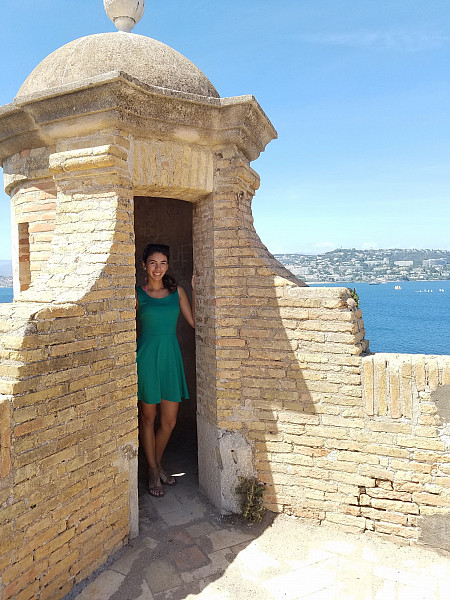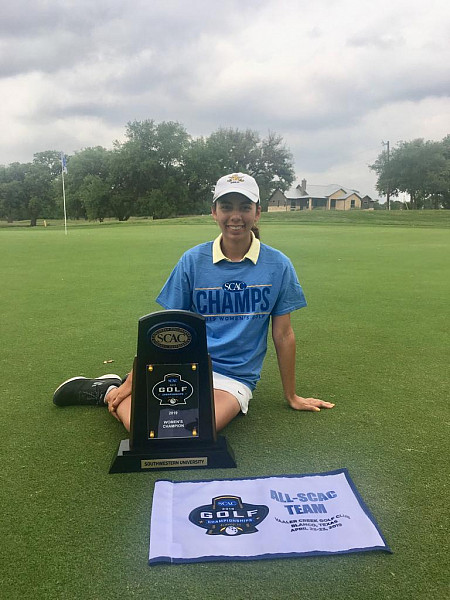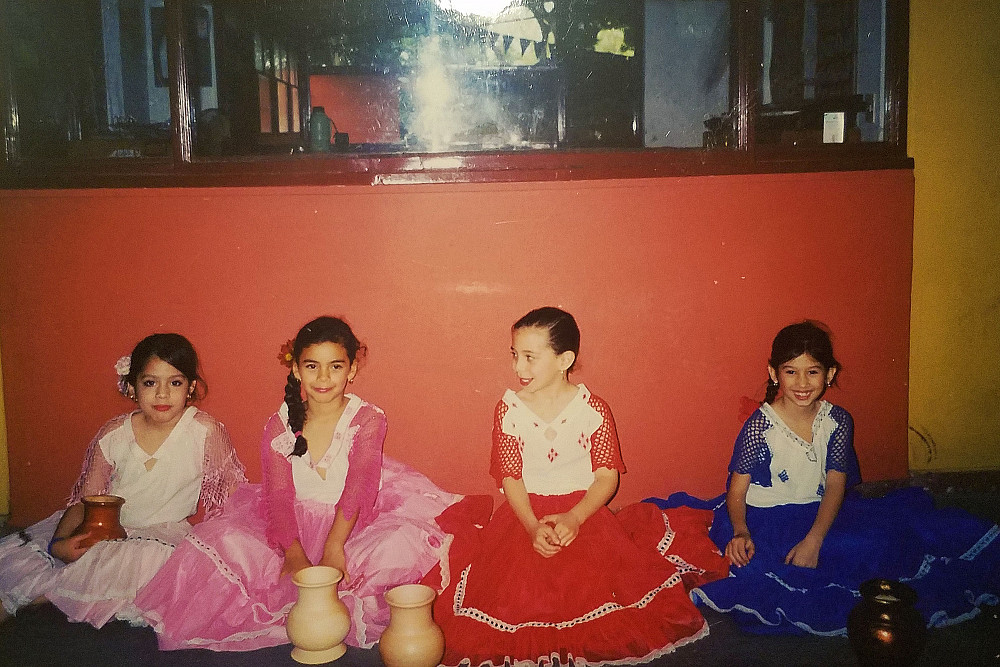News
A Student of the World
August 15, 2019
August 15, 2019

Valentina Olivieri–Puentes hasn’t been back since 2015, and her parents have been living in Georgetown the past few years, but she still calls Paraguay home. “It’s funny because even though I lived in Paraguay and I was raised there for 15 years, I don’t know my country at all,” the recent graduate admits. The landlocked country comprises 17 departments (i.e., the equivalent of states in the U.S.), but Olivieri-Puentes spent most of her youth in the capital district, with only brief trips outside Asunción to participate in golf tournaments. “There are so many beautiful things about Paraguay that I still don’t know about, so whenever I do go back, which I hope is soon, I hope to explore more,” she says.
Olivieri-Puentes and her family left Paraguay halfway through her sophomore year in high school. She transferred to Windermere Preparatory School in Florida, where she enjoyed easy access to the Magic Kingdom at Walt Disney World and marveled at the fireworks every night. When the young student-athlete began considering colleges, her parents advocated applying to smaller private universities, where she could continue playing golf, and because most of her mother’s siblings were living in Texas, Southwestern University made the list.
“I love Southwestern because of the green feel,” she remarks. “It just makes me feel like I’m on a golf course,” she says.
A player and a scholar of golf
Olivieri-Puentes first started playing golf and tennis when she was only 3-1/2 years old. She and her friends would burn off energy while playing for fun. But one day, the future Pirate was swinging her miniature plastic clubs around, and a coach from the local academy spotted her and approached her parents. “She’s a natural! I would love to train her,” he told them. Given she was a year and a half younger than the youngest students, her parents were reluctant at first, but they decided to give it a try.
The preschooler placed in her first tournament soon after. “I won second place. I still have the trophy,” Olivieri-Puentes grins. At age 5, she traveled to Virginia to represent Paraguay in the U.S. Kids Golf World Championship, where she came in fifth. Going pro was certainly on the horizon: she was a national champion in her age group five years in a row, and by age 13, she had won 80 trophies and made five holes in one—an unusual feat for such a young player.
However, a series of family setbacks would cause the family to move from Paraguay to Florida, where Olivieri-Puentes joined an afterschool academy but began reorienting her priorities. “Golf is a huge part of who I am,” she reflects. “But my parents always emphasized academics before athletics.”

But Olivieri-Puentes has also adopted an academic perspective on her sport. In her recent capstone project for her communications major, for example, she analyzes the Instagram account of the Ladies Professional Golf Association (LPGA) to determine whether their social-media presence was promoting or trivializing female players’ reputation. She concludes that the posts’ focus on the players performing certain stereotypes of femininity, fulfilling Western ideals of beauty, and privileging unprofessional content ultimately trivializes the accomplishments of women golfers and the LPGA. She recounts that her project was partly prompted by an incident on the course in which she was the brunt of sexist comments. Since then, she writes, “I [have become] determined to establish more respect for myself as a golfer both on and off the course as well as aid in the fight for more equality between the sexes in golf, at an amateur and professional level.”
Celebrating one’s native culture
As a communications major, Olivieri-Puentes is used to analyzing … well, almost everything. In addition to examining the implications of the LPGA’s social-media messaging, she’s had reason to think about the similarities and differences between Paraguay and the U.S.—and Texas in particular. And despite her charming modesty about the limits of her knowledge about her home country, she knows far more than she owns.
She says her home country and her home here in Texas have been fairly similar temperature-wise, with scorching summers and mild winters. She also says people eat a lot of steak in both cultures—but that quickly morphs into a source of difference. “We don’t season the steak as much as here, and we don’t use as many sauces,” she explains. “I’m not a big fan of barbecue here just because it’s really dry meat with a lot of spicy sauces, and we don’t cook spicy over there. In Paraguay, we’re more about the big, juicy steak with just salt and pepper on it.”
Another point of difference is that Paraguay “cherishes its indigenous tribes,” a reverence they demonstrate in various ways. For example, the country has two official languages, Spanish and Guarani; the majority of the population speaks Guarani while half of the rural population speaks the indigenous tongue exclusively. Olivieri-Puentes—who initially minored in French and has taken several Mandarin Chinese courses but ultimately decided to minor in Spanish at Southwestern—fondly recalls studying the indigenous language from first to eighth grade. “I respect Guarani, and I love it,” she says. Paraguay also celebrates its diversity and indigenous roots annually on August 22, Folklore Day, when classes are canceled so that children and adults alike can don traditional garments, participate in folk dances and ceremonies, and feast on authentic foods. “That’s how we remember the past, which is really nice,” she says.
In contrast to Parguay’s focus on national heritage, during her years at Southwestern, Olivieri-Puentes has been amused by the proliferation of state-specific trappings: Texas flags, Texas bumper stickers, Texas-shaped food, Texas apparel. Like most students who come from not just out of the country but even just out of state, she’s been fascinated by residents’ ebullient pride in and love for the Lone Star State. “Texas really celebrates its Texanness,” she laughs.

Learning by questioning
As an international student at Southwestern, Olivieri-Puentes says she misses Paraguayan cuisine and her best friends back home—at least with the latter, she can keep up with hometown news through online messaging apps. She also admits that some of the paperwork and the restrictions on her ability to work off campus have been trying. But she appreciates being able to educate her classmates about her home country. She acknowledges, however, that she prefers her classmates asking questions rather than starting conversations from the vantage point of mere assumptions. For example, instead of assuming that Paraguay is in Africa (it’s in South America) or that Paraguayans live in huts in the jungle (Paraguay is a developed country), a fellow student might ask, “Where is Paraguay? What is it like?” When people demonstrate a genuine interest, she enjoys sharing her thoughts about her home’s natural beauty, its political system, and its economy. “I find it admirable in my friends when they ask me questions,” she says. “That’s how we all learn.”
She appreciates majoring in communications because her classes have emphasized that students shouldn’t try to label other people for the sake of convenience. “We talk about that in comm all the time: our society is so fixated on trying to put us in boxes so they know how to treat you,” she notes. She says just as people have assumed that she’s from Mexico because she speaks Spanish, others have warned her not to “go turning Texan on us,” and still other classmates have prejudged others because of their political affiliations or sexual orientations. She believes that such stereotyping belies the fascinating diversity of individual identities people inhabit. “Just accept me for what I bring to the table instead of judging me or focusing on what I look like, what I speak, or what I sound like,” she asserts. “Listen to what I have to say because my experience is much different from yours, and maybe we can both get something out of this. I love talking to my friends when they ask me about my culture. This is how you learn, this is how you stay away from ignorant people, and this is how you create a more diverse culture.”

Having graduated this past May, Olivieri-Puentes hopes to attend graduate school in public relations. And because she’s had the opportunity to live in various countries and on three continents—while at SU, she studied abroad in Cannes, France, which she loved, and feels fortunate to have visited Scotland, Monaco, Italy, and the Netherlands—she’s not tethered to any particular place.
Of her four years at the University, she says, “It’s been a journey. I definitely grew.”
She says one significant lesson she had to learn was self-reliance. That was especially true while studying abroad. “I became less dependent on my parents, and especially being from a Hispanic culture, [in which] you’re always surrounded by your family, I’ve had to learn how to do stuff on my own,” she comments. “That was a very big step for me.”
Her years as a collegiate student–athlete have taught her that golf is sometimes a group endeavor and not just an individual sport. “That was something really big for me,” she relates. “Here, I was still by myself on the course, but my coach could talk to me and give me advice, and my teammates also depended on me for my scores. So learning how to work with a team was very interesting. They’re all great women. I’ve learned that you have to look out for yourself, but [you also need to] be surrounded by people who actually help you grow and challenge you every day. …You just have to respect each other.”
Finally, she values her academic coursework at Southwestern. She appreciates the Paideia approach because it reminds her of the International Baccalaureate curriculum she benefited from before college. “Obviously, becoming more educated is so great. The faculty is great here. I like the idea of the liberal arts, where you can take all types of classes—I can definitely say I came out a more well-rounded person. With all the different classes, a lot of knowledge has been put into my head!” she laughs. “It’s hard to look at something and not analyze it now. I see so many connections everywhere.”















